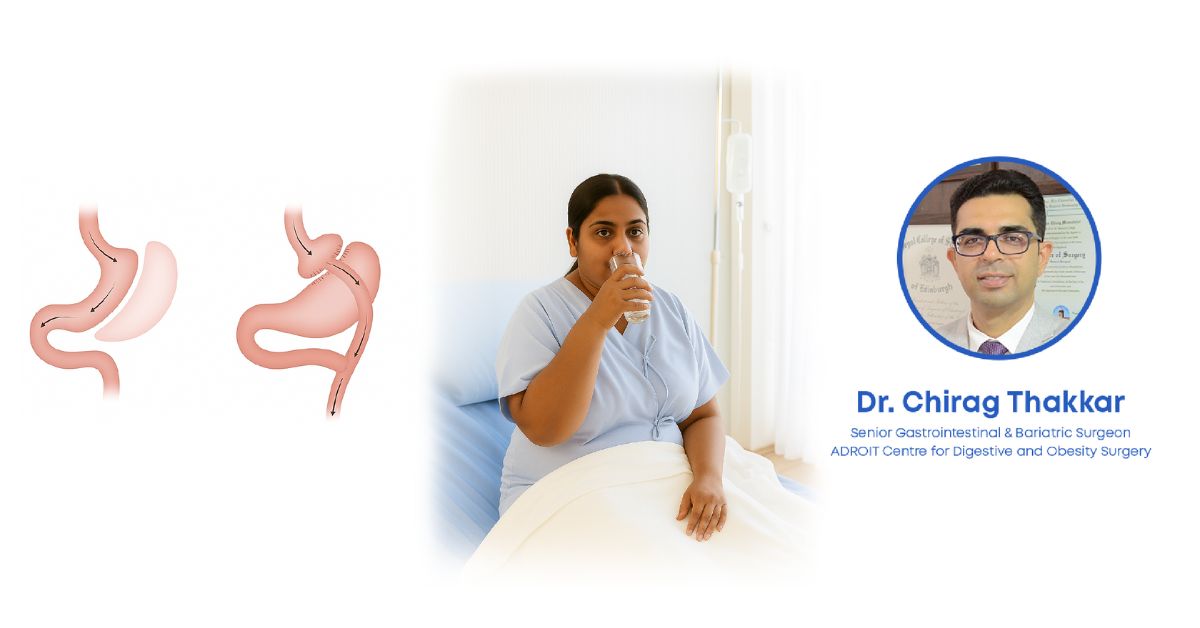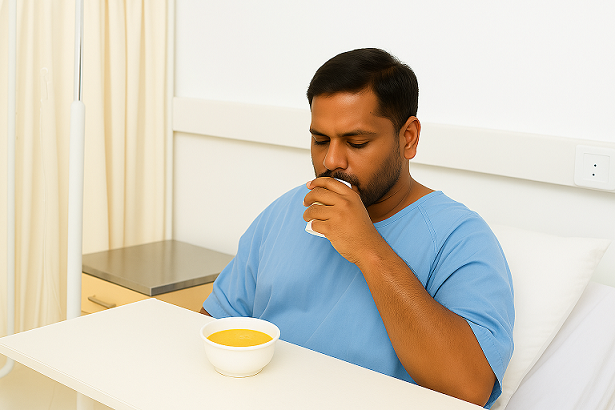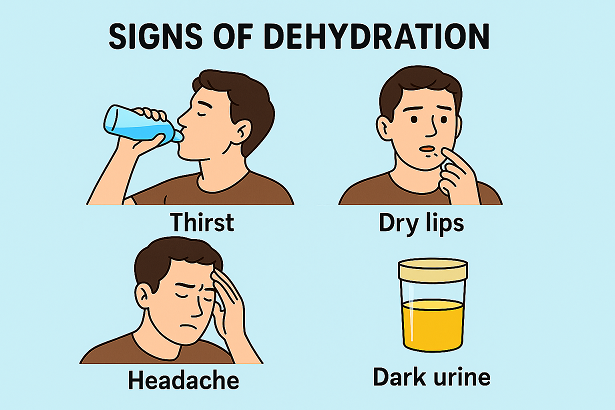
Table of Content
Staying hydrated is nowadays a very much discussed topic in various contexts on social media. But for Bariatric patients, staying hydrated after bariatric surgery has special significance. Bariatric patients who have undergone surgery recently have tissues of the stomach undergoing the healing process. They are advised to be on a liquid diet for a few days to avoid irritation to the surgical site from solid food. Their stomach size is also reduced. Subsequently, their intake is also reduced. If conscious efforts to stay hydrated are not made, the chances of dehydration are higher. This may affect the recovery process. In addition to this, our Indian climate is also hot, so here we try to give you practical tips to stay hydrated after bariatric surgery and to feel healthy and refreshed.

Staying hydrated after a bariatric surgery is not difficult per se, but a bit tricky. If you are not aware of fluid intake and how to manage adequate fluid intake prior to surgery, then it may pose some challenges. But with proper pre-surgery counselling about the post-bariatric surgery diet progression, this initial phase after surgery becomes a smooth progression to later diet phases. Many times, patients take this matter quite lightly and do not give it significance. Actually, there are certain reasons behind this.
One of the reasons is that they are habituated to gulp glassfuls of water and do not have the habit of sipping water. Now, due to the reduced stomach size, the tissues are not completely healed, and they can not drink a glassful of water at a time during the initial days after bariatric surgery. But they have to understand that, at least for the initial couple of days, they have to follow the SIP and wait method. They should keep a water bottle with them and sip water frequently. For the initial days, as recommended by your surgeon and dietician, take a sip of water and then wait for a few minutes and then again take a sip.
Secondly, in peak summer, due to excessive sweating, extra care is required to stay hydrated. In this situation, electrolyte balance also gets disturbed. Immediately, one has to take advice from your dietician for electrolyte supplements.
The third reason is forgetting to be consistent in sipping water. When they are occupied with other activities, they forget to have water. Our advice is to keep a sipper bottle with fluids with you, even while working, so that you can sip frequently even while working. Many of our patients have managed this after resuming work a few days after surgery.
One more point, we noticed that patients consider only water as a means of hydration. There is no doubt that water is the best liquid and optimal liquid for hydration, but for the sake of change to avoid boredom, we Indians have other options also in our staple diet to keep ourselves hydrated. The options are diluted chas(buttermilk), coconut water, clear soup, fruit juices, rice water and dal soup. Non-vegetarians can have chicken or bone soup after removing the chicken piece. The only point to keep in mind is that all are to be filtered before consumption.

These are mild to moderate dehydration symptoms. Listen to your body consciously and take appropriate measures to avoid severe dehydration for smooth recovery.

Drink water sip by sip, but don’t gulp. Take a small sip every few minutes, but don’t drink a glassful at a time. Keep a graduated bottle filled with water with you everywhere.
It is not a rule, but it is recommended to prevent introducing a large amount of air into the small stomach, which may cause discomfort and occupy valuable small stomach space. Another point behind such a recommendation is to make drinking slower and mindful.
Don’t forget to carry a water bottle with you during any activities, whether it is an outing with friends, work meetings, travelling, festivities, studying, or office work. Set a reminder properly to keep you reminded.
Avoid drinking at the time of a meal. Wait 30 minutes before and 30 minutes after a meal. Try to spread your water intake throughout the day.
Don’t drink too hot or too cold water or any drink.
Caffeine has many negative impacts on the body, such as interfering with nutrient absorption. It is a stomach irritant. It is an appetite suppressant that prevents patients from reaching their protein intake goal. But as far as hydration is concerned, it has a diuretic effect. It flushes out water from the body. For bariatric patients, who are struggling to stay hydrated, it is a significant concern.
Carbonated drinks can cause bloating. This gas can cause stomach pouch extension, which hinders the weight loss process.
Sugary drinks are calorie-rich but poor in nutrient value. Such drinks are called empty calories. Filling your small stomach with such sugary drinks keeps you deprived of necessary nutrients and can inhibit weight loss. In addition to this, sugary drinks move too quickly from the stomach to the intestine. This causes symptoms of Dumping syndrome, like nausea, vomiting, bloating, abdominal cramps, sweating, etc.
As it causes dumping syndrome, it should be avoided completely.
Human nature needs variations to avoid boredom. As mentioned previously, the options are diluted chas (buttermilk), coconut water, clear soup, fruit juices, rice water and dal soup. Non-vegetarians can have chicken, fish or bone soup after removing the pieces. One can also use infused water in various combinations of your choice, like cucumber, lemon, pineapple, mint, blueberries, strawberries, tulsi, cumin, ajwain and fennel seeds water, etc. The only point to keep in mind is that all are to be filtered before consumption.
Track your water intake regularly for at least a few days properly. Try to drink approximately 150–200 ml every 1 hour for 17 hours a day (e.g. 7 AM to 11 PM). In total, approximately 2000–2500 ml of water/liquid intake is recommended.
The healing of each patient is different. Don’t compare yourself with other patients. Follow the advice given to you by your doctor.
Your health journey is personal. Whether you’re dealing with overweight issues, obesity, or obesity combined with multiple medical problems, the right medical approach can make all the difference. Dr. Chirag’s approach focuses on patient education, precision, and compassionate care.
If you’re seeking the best weight loss, obesity, bariatric doctor in Ahmedabad, look for a specialist who combines medical expertise with a patient-first approach. Your path to recovery starts with understanding your options and working with a trusted medical professional. Get in touch with us.
You can book a video consultation with Dr. Chirag Thakkar. Call +91-8156078064 /+91-8469327630 or contact us to fix an appointment. Visit the ADROIT Centre for Digestive and Obesity Surgery for consultation.
Please subscribe to our YouTube channel to stay connected.
Dr. Chirag Thakkar is a gastrointestinal surgeon. He has been carrying out Gastrointestinal and Weight loss / Bariatric and Metabolic Surgery for the past 18 years. Surgery for GERD, hiatus hernia and obesity are his core areas of interest and expertise. For Acid reflux / GERD treatment, ADROIT is one of the leading centres in India, providing all facilities under one roof. Even in the case of laparoscopic hernia surgery for complex and recurrent hernias, patients recover faster with minimal post-surgery pain and the best functional outcome. He also has vast experience in Laparoscopic surgery for gallstone removal.

Dr Chirag Thakkar
Senior Gastrointestinal and Bariatric surgeon
GERD and Esophageal Motility Expert
Hernia Surgery Specialist
Founder Director of ADROIT Centre for Digestive and Obesity Surgery